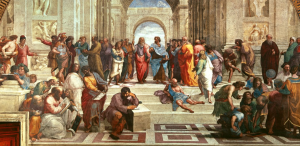
One of the important questions we must be able to answer for ourselves at Virtue Ministry is, “What is virtue?”
The answer was something I wasn’t so sure of when starting out a year ago.
The definition in my mind was quite ambiguous. Virtue was “something good”. It was a characteristic of noble heroes and good people. It was something I knew I should have. However, not really knowing what it was made it impossible for me to know if I really had it.
What is virtue? Answers have been near and far from the truth.
It’s a moral excellence. The authentic practice of a good life.
Virtue allows us to pursue one of our most inherent desires as humans – happiness.
Theories as to how we can achieve happiness have come from science, philosophy and religion for thousands of years. Science provides us with knowledge, philosophy allows us to use our reason and religion defines our purpose. In Christianity, these ideas do not compete but are instead united in the practice of virtue.
And this is something that was determined by intelligent humans even before Christ came on earth.
Aristotle recognised and emphasised the importance of virtue in humanity. He recognised that –
We all seek a good life and that we can only be satisfied with the highest good – eudaimonia.
Our most common mistake in pursuing this good is the methods by which we seek to achieve it – material wealth, praise from others or satisfying bodily pleasures. How often do we see this in society and even in our own lives?
Our Christian faith rejects all of these methods of achieving pleasure, and Aristotle did too.
He realised material wealth is something we can only use in transaction for other goods – these are usually material as well.
As for praise – this might be an even less fruitful attempt to cultivate pleasure as we are relying on the opinion of others to raise us up.
Finally, the practice of fulfilling bodily desires is identified by Aristotle as unacceptable in seeking happiness as it is absent of our reason. Animals seek “happiness” by satisfying the bodily desires, but humans cannot fully achieve happiness this way because we must exercise all our human faculties in order to achieve the highest good (and this includes reason!).
So where does this leave us? How can we achieve happiness if not via one of these ways? Sometimes, these methods do bring us joy, right?
But this “joy” is quite often superficial. It lacks longevity and too much or not enough of any of these leaves us unsatisfied.
THAT’S where virtue comes in.
Between the excesses and inadequacies of material wealth, praise and bodily desires, true virtue is the constant practice of balancing these through goodness.
The practice of virtue allows us to be human to the fullest – to live life to the fullest!
Through science, we learn objective truth.
Through philosophy, we reason how we should act in response to this truth.
With religion, we realise the will of God for us to live according to the truth and so we align our will with His – this being the highest good.
Make no mistake, this isn’t easy. But even Aristotle acknowledged that. He said –
“We are what we repeatedly do. Excellence, then, is not an act, but a habit.”
God knows this too. St. Paul says –
“We must never get tired of doing good because if we don’t give up the struggle we shall get our harvest at the proper time” (Gal 6:9).
Furthermore, in acknowledging this struggle, God helps us. His “grace is sufficient… where I am weak, He is strong” (2Cor 12:9-11).
We are imperfect. We will fail at this at time. But how good does it feel when we do the right thing? How satisfying is it when we say a small “no” to the things of this world so that we can say an even bigger “yes” to all we were created to be?

Elise Drum
Elise is a second year Medical student in Sydney from rural NSW who enjoys a variety of sports and being outdoors. She also loves food but when it comes to cooking – she claims to burn water.
